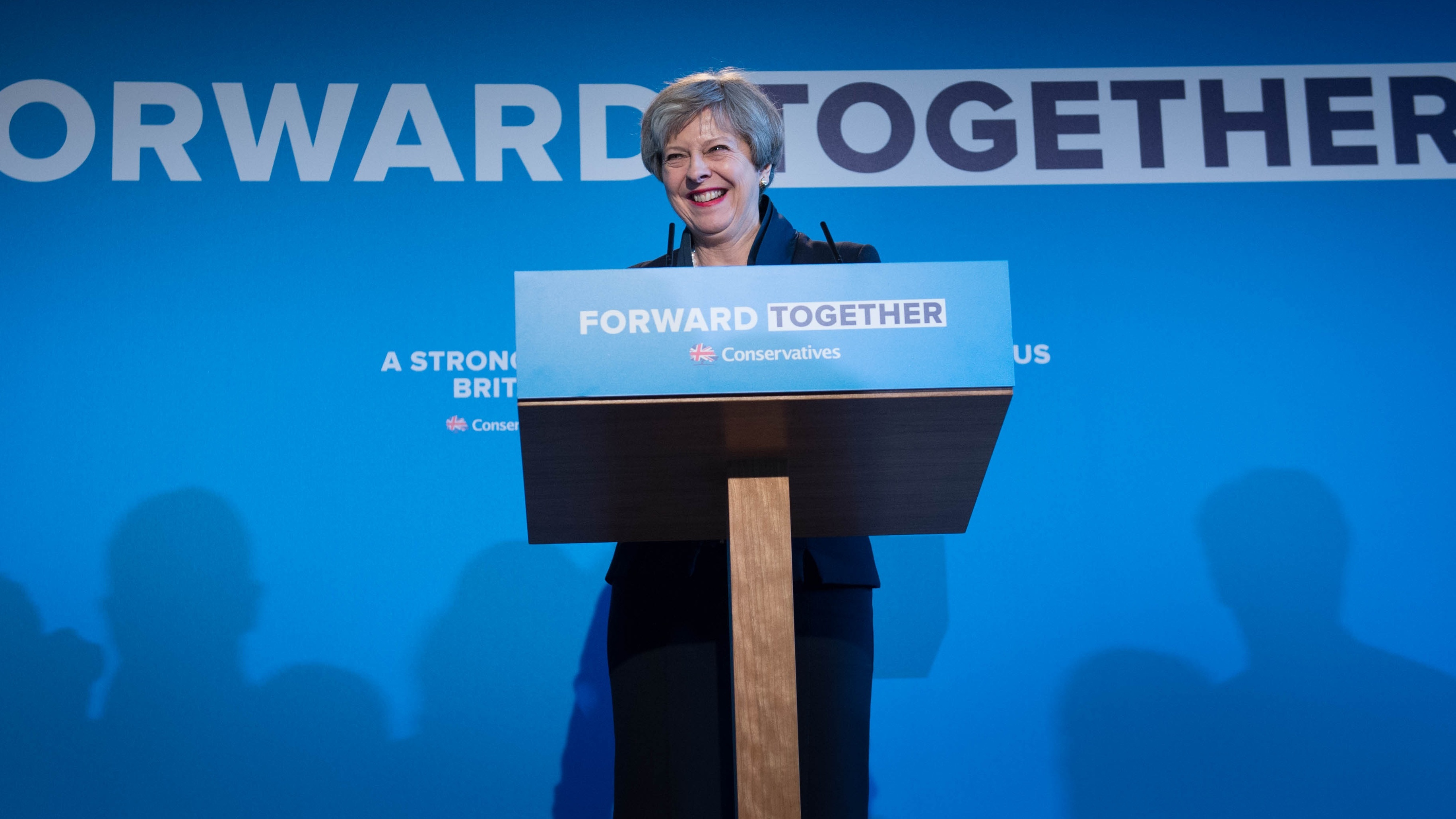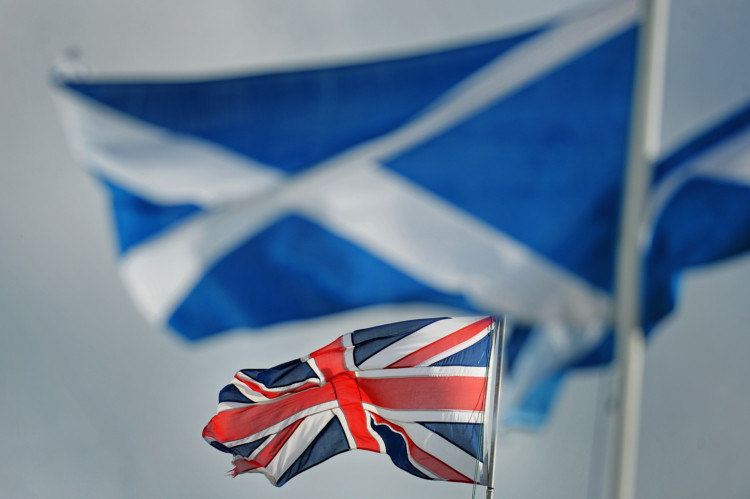
THERESA MAY promised that a Conservative government will tackle the “five giant challenges” facing Britain over the coming decade, as she launched the party’s manifesto for the June 8 general election.
In a foreword to the document, the Prime Minister warns that the next five years will be the most challenging period the UK has faced for 60 years.
With that in mind, here are the key points from the Conservative manifesto.
On tax
A manifesto to see us through Brexit and beyond. A plan for a stronger, fairer, more prosperous Britain. pic.twitter.com/oHdvxu95eE
— Conservatives (@Conservatives) May 18, 2017
Corporation tax to fall to 17% by 2020.
A full review of business rates.
On spending
A balanced budget by the “middle of the next decade”.
On wages
Increase so-called national living wage to 60% of median earnings by 2020 then by the rate of median earnings.
Legislation to make executive pay packages subject to annual votes by shareholders and listed companies will have to publish the ratio of executive pay to “broader UK workforce” pay.
On the media
Second part of the Leveson Inquiry into the culture, practices and ethics of the press will not take place.
Repeal section 40 of the Crime and Courts Act 2014, which would – if enacted – force newspapers to pay their opponents’ legal costs linked to libel and privacy actions, even if they win in court, if they are not signed up to an officially-recognised regulator.
On pensions
Maintain the triple lock pension guarantee until 2020, then replace it with a double lock – meaning pensions will rise in line with earnings or inflation, whichever is highest.
Tougher punishments for those caught mismanaging pension schemes.
Provide new powers to the Pensions Regulator to issue “punitive” fines for those found to have “wilfully left a pension scheme under-resourced” and, if necessary, powers similar to those held by the Insolvency Service to disqualify the relevant company directors.
Consider a new criminal offence for company directors who “deliberately or recklessly put at risk” a pension scheme’s ability to meet its obligations.
On Indy Ref 2

A second independence referendum would not take place unless there was ‘public consent’ and only then if it was after the Brexit process has concluded.
Conservative manifesto says Indy Ref 2 could only take place with ‘public consent’ and after Brexit – click here to read more
On Brexit
If we get Brexit right, we can use this moment of change to build a stronger, fairer, more prosperous Britain here at home. pic.twitter.com/nk9883flRm
— Conservatives (@Conservatives) May 18, 2017
Exit the European single market and customs union but seek a “deep and special partnership” including a comprehensive free trade and customs agreement.
A vote in both Houses of Parliament on the “final agreement” for Brexit.
Assess whether to continue with specific European programmes and it “will be reasonable that we make a contribution” to the ones which continue.
Agree terms of future partnership with EU alongside withdrawal, both within the two years allowed under Article 50.
Convert EU law into UK law and later allow Parliament to pass legislation to “amend, repeal or improve” any piece of this.
Remain signatories to the European Convention on Human Rights for the next parliament.
Repealing or replacing the Human Rights Act “while the process of Brexit is under way” ruled out, although consideration will be given to the UK’s “human rights legal framework” when Brexit concludes.
On immigration
Aim to reduce annual net migration to the tens of thousands
Students expected to leave the country at the end of their course unless they meet new “higher” requirements allowing them to stay.
Overseas students to remain in the immigration statistics.
Homelessness
Halve rough sleeping over the course of the next parliament and eliminate it by 2027.
On markets
Make it clearer for mobile phone customers to know when they have paid off the price of their handset.
Consider a ban on companies which cold call people to encourage them to make false personal injury claims.
Reduce insurance costs by “cracking down on exaggerated and fraudulent” whiplash claims.
Review rail ticketing to remove “complexity and perverse” pricing, with a passenger ombudsman introduced.
Minimum service levels agreed with train companies and staff during times of industrial action. A pledge to make this mandatory if a deal cannot be reached voluntarily.
Smart meters offered to every household and business by the end of 2020.
Make it easier to switch energy providers and introduce a “safeguard tariff cap”.
Introduce a “breathing space” scheme to help those in serious debt be protected from further interest, charges and enforcement action for up to six weeks.
On defence
Spend at least 2% of GDP on defence and increase the budget by at least 0.5% above inflation in every year of the new parliament.
Pledge to “maintain” the overall size of the armed forces.
Retain the Trident continuous-at-sea nuclear deterrent.
Better compensation for injured personnel and the families of those killed in combat.
On crime and Justice
Create a “national infrastructure police force”, which brings together the Civil Nuclear Constabulary, the Ministry of Defence Police and British Transport Police.
Serious Fraud Office to be incorporated into the National Crime Agency.
£1 billion to modernise the prison estate
Legislation to make changes in police practices if “stop and search does not become more targeted and stop to arrest ratios do not improve”.
Legislate if progress not made to reduce the “disproportionate use of force” against black, Asian and ethnic minority people in prison, young offender institutions and secure mental health units.
On housing
Why we will help those struggling to afford a home of their own by building more affordable homes.
— Conservatives (@Conservatives) May 18, 2017
Meet 2015 commitment of a million homes by the end of 2020, with a further 500,000 by the end of 2022.
New “council housing deals” to allow local authorities to build more social housing.
Fixed-term social houses, to be sold privately after 10 to 15 years with an automatic right to buy for tenants. Cash raised from sales to be used to build further properties.
On education
Increase overall schools budget by £4 billion by 2022.
Ensure no school has its budget cut as a result of new formula seeking to make funding fairer.
A free school breakfast to every child at primary school.
An end to free school lunches for all children in their first three years of primary school.
At least 100 new free schools a year.
Lifting the ban on grammar schools, with conditions including allowing pupils to join at other ages as well as 11.
A specialist maths school to be opened in every major city in England due to new funding arrangements.
Every 11-year-old expected to know their times tables off by heart.
On health
Increase NHS spending by a minimum of £8 billion in real terms over the next five years.
A new GP contract and changes to the contract for hospital consultants.
Retain the 95% A&E target.
No-one will have to sell their home to pay for care costs in their lifetime while a person’s assets would not be allowed to dip below £100,000 as a result of paying for care.
Means-test winter fuel payments.

Enjoy the convenience of having The Sunday Post delivered as a digital ePaper straight to your smartphone, tablet or computer.
Subscribe for only £5.49 a month and enjoy all the benefits of the printed paper as a digital replica.
Subscribe









